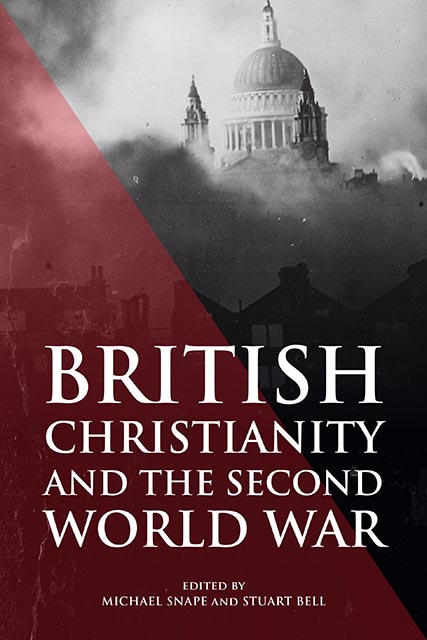Book contents
- Frontmatter
- Dedication
- Contents
- Contributors
- Acknowledgements
- Note on Footnotes
- Abbreviations
- 1 Introduction
- 2 The British State and Spiritual Mobilization during the Second World War
- 3 Radio Religion: The British Broadcasting Corporation and Faith Propaganda at ‘Home’ and ‘Overseas’ in the Second World War
- 4 Getting the Message Out: Publishing ‘British Christianity’ 1939–43
- 5 Christianity, Culture, and the Universities in Wartime England
- 6 Mass Observation, Religion, and the Second World War: When ‘Cooper’s Snoopers’ Caught the Spirit
- 7 British Sunday Schools during the Second World War
- 8 Principled or Pragmatic? English Nonconformist Opposition to Pacifism in the Inter-War Period
- 9 Where Loyalties Lie: English Catholic Responses to Allied Strategic Bombing in the Second World War
- 10 British Christians and the Morality of Killing in the Second World War
- 11 Jewish-Christian Relations in the Second World War
- 12 Agents of Occupation or Reconciliation? Army Chaplains in Germany in the Summer of 1945
- Index
- Studies in Modern British Religious History
6 - Mass Observation, Religion, and the Second World War: When ‘Cooper’s Snoopers’ Caught the Spirit
Published online by Cambridge University Press: 21 June 2023
- Frontmatter
- Dedication
- Contents
- Contributors
- Acknowledgements
- Note on Footnotes
- Abbreviations
- 1 Introduction
- 2 The British State and Spiritual Mobilization during the Second World War
- 3 Radio Religion: The British Broadcasting Corporation and Faith Propaganda at ‘Home’ and ‘Overseas’ in the Second World War
- 4 Getting the Message Out: Publishing ‘British Christianity’ 1939–43
- 5 Christianity, Culture, and the Universities in Wartime England
- 6 Mass Observation, Religion, and the Second World War: When ‘Cooper’s Snoopers’ Caught the Spirit
- 7 British Sunday Schools during the Second World War
- 8 Principled or Pragmatic? English Nonconformist Opposition to Pacifism in the Inter-War Period
- 9 Where Loyalties Lie: English Catholic Responses to Allied Strategic Bombing in the Second World War
- 10 British Christians and the Morality of Killing in the Second World War
- 11 Jewish-Christian Relations in the Second World War
- 12 Agents of Occupation or Reconciliation? Army Chaplains in Germany in the Summer of 1945
- Index
- Studies in Modern British Religious History
Summary
Religion was a strong undercurrent to Britain's Second World War effort, and government was not slow to exploit its value for propagandist, patriotic, and civilian morale purposes, portraying the conflict as a defence of Christian civilization against totalitarian evil. This approach was exemplified by the Religions Division within the Ministry of Information (MOI), which published a weekly home bulletin on The Spiritual Issues of the War. However, the state did not otherwise proactively research wartime religion. Thus, faith bodies were absent from the official statistical digest of the war and religious matters were not central to the work of Home Intelligence or the Wartime Social Survey (WSS). The commercial British Institute of Public Opinion (BIPO, Gallup Poll's British arm, launched in 1937) likewise took only an episodic interest. By contrast, its more qualitative rival, Mass Observation (MO), established in the same year with bases in Bolton and London, maintained its pre-war concern with religion as part of a broader avowed intent to compile a documentary record of the Second World War. This archive, opened at the University of Sussex in 1975, and substantially reproduced in Adam Matthew's Mass Observation Online, has already become a well-mined primary resource for the study of wartime Britain. The aims of this chapter, which is structured chronologically, are to signpost the major religion-related documents in this collection, and to summarize MO's impressions of the state of faith on the Home Front during the conflict.
Background to MO
MO had been founded in January 1937 as an independent social research organization to investigate the anthropology of everyday life in Britain by means of qualitative and ethnographic methods. It was a collaboration between two young men from upper-middle class and public-school backgrounds but lacking a secure income. Tom Harrisson (1911–76) was an ornithologist turned anthropologist, recently returned from the South Pacific islands of the New Hebrides, which were the subject of his Savage Civilisation, a book whose publication coincided with the launch of MO. Charles Madge (1912–96) was a poet who eventually became an academic sociologist. Their relationship was far from easy and brief, Madge ceasing his involvement with MO in July 1940. Thereafter, sole responsibility for the organization lay with Harrisson, not totally interrupted even by his call-up for military service in July 1942, with only his posting overseas two years later forcing him to cede control to MO's acting director, Bob Willcock.
- Type
- Chapter
- Information
- British Christianity and the Second World War , pp. 99 - 116Publisher: Boydell & BrewerPrint publication year: 2023

